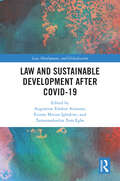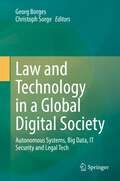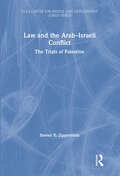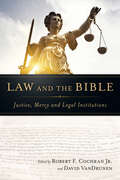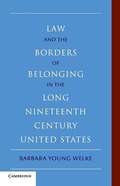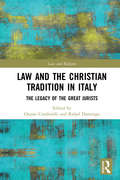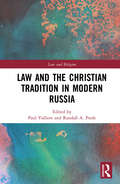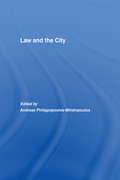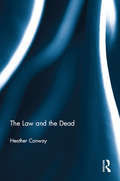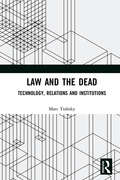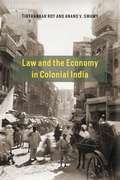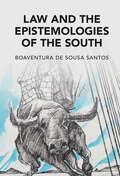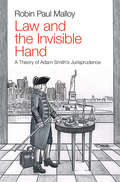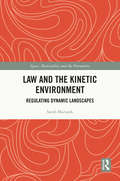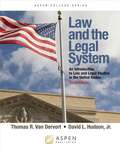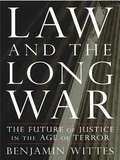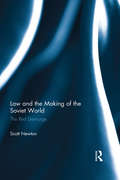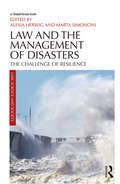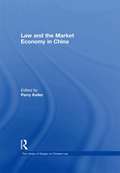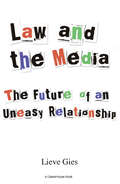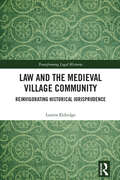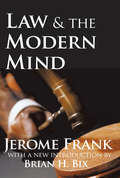- Table View
- List View
Law and Sustainable Development After COVID-19 (Law, Development and Globalization)
by Augustine Edobor Arimoro, Ezinne Mirian Igbokwe, and Tamaraoudoubra Tom EgbeThis book considers the impact of the COVID-19 pandemic on the realisation of the United Nations’ Sustainable Development Goals.Although efforts towards the attainment of the Sustainable Development Goals are ongoing, the COVID-19 pandemic has had a significant impact on these efforts: accentuating inequities, as well as absorbing resources. This book addresses this impact, as it takes up the question of how to ensure global recovery – in line with the target for the Sustainable Development Goals – after the pandemic. Adopting an interdisciplinary approach, but focusing particularly on the role of law and legal frameworks in this recovery, the book considers the effect of the pandemic on key industries such as shipping, insurance, manufacturing, and banking, as well as on the role of the State and non-State actors. Pursuing an explicitly Global South perspective, the book maintains that in the post-COVID era it is the elaboration a rule of law framework that is in sync with both the Global North and South that is crucial if the Sustainable Development Goals are to be achieved.This book will be of value to scholars, students and policymakers working in the general area of law and development, but especially those with specific interests in the United Nations’ Sustainable Development Goals.
Law and Technology in a Global Digital Society: Autonomous Systems, Big Data, IT Security and Legal Tech
by Georg Borges Christoph SorgeThis book examines central aspects of the new technologies and the legal questions raised by them from both an international and an inter-disciplinary perspective. The technology revolution and the global networking of IT systems pose enormous challenges for the law. Current areas of discussion relate to autonomous systems, big data and issues surrounding legal tech. Ensuring data protection and IT security as well as the creation of a legal framework for the new technology as a whole can only be achieved through international and inter-disciplinary co-operation.The team of authors is made up of experienced, internationally renowned experts as well as young researchers and professionals who give valuable insights from numerous different jurisdictions. This book is written for jurists and those responsible for technology in public authorities and companies as well as practising lawyers and researchers.
Law and the Arab–Israeli Conflict: The Trials of Palestine (UCLA Center for Middle East Development (CMED) series)
by Steven E. ZippersteinDuring the British Mandate for Palestine (1922–1948), Arabs and Jews repeatedly used the law to gain leverage and influence international opinion, especially in three dramatic and largely forgotten trials involving two issues: the interplay between conflicting British promises to the Arabs and Jews during World War I, and the parties’ rights and claims to the Wailing Wall. Focusing on how all three parties – Arab, Jewish, and British – used the law and the legal process to advance their objectives during the Mandate years, this volume reveals how the parties availed themselves – with varying degrees of success – of the law and the legal process. The book examines various legal arguments they proffered, and how that early tendency to resort to the law as a tool, a resource, and a weapon in the conflict has continued to this day. The research relies almost entirely on primary source documents, including transcripts of the public and secret testimony before the Shaw, Lofgren, and Peel Commissions, diaries, letters, government files, and other original sources. This study explores the origins of many of the fundamental legal arguments in the Arab–Israeli conflict that prevail to this day. Filling a gap in research, this is a key text for scholars and students interested in the Arab–Israeli conflict, Lawfare, and the Middle East.
Law and the Borders of Belonging in the Long Nineteenth Century United States
by Barbara Young WelkeFor more than a generation, historians and legal scholars have documented inequalities at the heart of American law and daily life and exposed inconsistencies in the generic category of “American citizenship.” Welke draws on that wealth of historical, legal, and theoretical scholarship to offer a new paradigm of liberal selfhood and citizenship from the founding of the United States through the 1920s. Law and the Borders of Belonging questions understanding this period through a progressive narrative of expanding rights, revealing that it was characterized instead by a sustained commitment to borders of belonging of liberal selfhood, citizenship, and nation in which able white men’s privilege depended on the subject status of disabled persons, racialized others, and women. Welke’s conclusions pose challenging questions about the modern liberal democratic state that extend well beyond the temporal and geographic boundaries of the long nineteenth century United States.
Law and the Brontës
by Ian WardIn its exploration of legal issues presented in novels of the Brontë sisters, this book represents a significant and original contribution to the study, not just of the Brontës and the mid-nineteenth century 'woman's novel', but also the situation of women in nineteenth century English law and the debates which moved around its prospective reform.
Law and the Christian Tradition in Italy: The Legacy of the Great Jurists (Law and Religion)
by Orazio Condorelli Rafael DomingoFirmly rooted on Roman and canon law, Italian legal culture has had an impressive influence on the civil law tradition from the Middle Ages to present day, and it is rightly regarded as "the cradle of the European legal culture." Along with Justinian’s compilation, the US Constitution, and the French Civil Code, the Decretum of Master Gratian or the so-called Glossa ordinaria of Accursius are one of the few legal sources that have influenced the entire world for centuries. This volume explores a millennium-long story of law and religion in Italy through a series of twenty-six biographical chapters written by distinguished legal scholars and historians from Italy and around the world. The chapters range from the first Italian civilians and canonists, Irnerius and Gratian in the early twelfth century, to the leading architect of the Second Vatican Council, Pope Paul VI. Between these two bookends, this volume offers notable case studies of familiar civilians like Bartolo, Baldo, and Gentili and familiar canonists like Hostiensis, Panormitanus, and Gasparri but also a number of other jurists in the broadest sense who deserve much more attention especially outside of Italy. This diversity of international and methodological perspectives gives the volume its unique character. The book will be essential reading for academics working in the areas of Legal History, Law and Religion, and Constitutional Law and will appeal to scholars, lawyers, and students interested in the interplay between religion and law in the era of globalization.
Law and the Christian Tradition in Modern Russia (Law and Religion)
by Paul Valliere and Randall A. PooleThis book, authored by an international group of scholars, focuses on a vibrant central current within the history of Russian legal thought: how Christianity, and theistic belief generally, has inspired the aspiration to the rule of law in Russia, informed Russian philosophies of law, and shaped legal practices. Following a substantial introduction to the phenomenon of Russian legal consciousness, the volume presents twelve concise, non-technical portraits of modern Russian jurists and philosophers of law whose thought was shaped significantly by Orthodox Christian faith or theistic belief. Also included are chapters on the role the Orthodox Church has played in the legal culture of Russia and on the contribution of modern Russian scholars to the critical investigation of Orthodox canon law. The collection embraces the most creative period of Russian legal thought—the century and a half from the later Enlightenment to the Russian emigration following the Bolshevik Revolution. This book will merit the attention of anyone interested in the connections between law and religion in modern times.
Law and the City: Theorising Environmental Law And The City (Law, Science And Society Ser.)
by Andreas Philippopoulos-MihalopoulosLaw and the City offers a lateral, critical and often unexpected description of some of the most important cities in the world, including Moscow, Istanbul, Berlin, Singapore, Athens, Mexico City, Toronto, Sydney, Johannesburg: each one from a distinctive legal perspective. An invaluable 'guide' to adopting a different approach to the city and its history, culture and everyday experience, Law and the City is not simply an exploration of the relationship between these two spheres. It details: a flourishing of law’s spatiality and urban legal locality an unfolding of both the juridical urban body and the city’s legal dreams, of both the ‘urban law’ and the ‘juridical polis’. Enlightening and at the same time problematizing the reader, this volume is an innovative collection of truly global dimensions that will prove compelling reading both for specialists and for critical travellers.
The Law and the Dead
by Heather ConwayThe fate of the dead is a compelling and emotive subject, which also raises increasingly complex legal questions. This book focuses on the substantive laws around disposal of the recently deceased and associated issues around their post-mortem fate. It looks primarily at the laws in England and Wales but also offers a comparative approach, drawing heavily on material from other common law jurisdictions including Australia, New Zealand, Canada and the United States. The book provides an in-depth, contextual and comparative analysis of the substantive laws and policy issues around corpse disposal, exhumation and the posthumous treatment of the dead, including commemoration. Topics covered include: the legal frameworks around burial, cremation and other disposal methods; the hierarchy of persons who have a legal duty to dispose of the dead and who are entitled to possession of the deceased’s remains; offences against the dead; family burial disputes, and the legal status of burial instructions; the posthumous use of donated bodily material; and the rules around disinterment, and creating an appropriate memorial. A key theme of the book will be to look at the manner in which conflicts involving the dead are becoming increasingly common in secular, multi-cultural societies where the traditional nuclear family model is no longer the norm, and how such legal contests are resolved by courts. As the first comprehensive survey of the laws in this area for decades, this book will be of use to academics, lawyers and judges adjudicating on issues around the fate of the dead, as well as the death industry and funeral service providers.
Law and the Dead: Technology, Relations and Institutions
by Marc TrabskyThe governance of the dead in the eighteenth and nineteenth centuries gave rise to a new arrangement of thanato-politics in the West. Legal, medical and bureaucratic institutions developed innovative technologies for managing the dead, maximising their efficacy and exploiting their vitality. Law and the Dead writes a history of their institutional life in the nineteenth and twentieth centuries. With a particular focus on the technologies of the death investigation process, including place-making, the forensic gaze, bureaucratic manuals, record-keeping and radiography, this book examines how the dead came to be incorporated into legal institutions in the modern era. Drawing on the writings of philosophers, historians and legal theorists, it offers tools for thinking through how the dead dwell in law, how their lives persist through the conduct of office, and how coroners assume responsibility for taking care of the dead. This historical and interdisciplinary book offers a provocative challenge to conventional thinking about the sequestration of the dead in the nineteenth and twentieth centuries. It asks the reader to think through and with legal institutions when writing a history of the dead, and to trace the important role assumed by coroners in the governance of the dead. This book will be of interest to scholars working in law, history, sociology and criminology.
Law and the Economy in Colonial India
by Anand V. Swamy Tirthankar RoySince the economic reforms of the 1990s, India's economy has grown rapidly. To sustain growth and foreign investment over the long run requires a well-developed legal infrastructure for conducting business, including cheap and reliable contract enforcement and secure property rights. But it's widely acknowledged that India's legal infrastructure is in urgent need of reform, plagued by problems, including slow enforcement of contracts and land laws that differ from state to state. How has this situation arisen, and what can boost business confidence and encourage long-run economic growth? Tirthankar Roy and Anand V. Swamy trace the beginnings of the current Indian legal system to the years of British colonial rule. They show how India inherited an elaborate legal system from the British colonial administration, which incorporated elements from both British Common Law and indigenous institutions. In the case of property law, especially as it applied to agricultural land, indigenous laws and local political expediency were more influential in law-making than concepts borrowed from European legal theory. Conversely, with commercial law, there was considerable borrowing from Europe. In all cases, the British struggled with limited capacity to enforce their laws and an insufficient knowledge of the enormous diversity and differentiation within Indian society. A disorderly body of laws, not conducive to production and trade, evolved over time. Roy and Swamy's careful analysis not only sheds new light on the development of legal institutions in India, but also offers insights for India and other emerging countries through a look at what fosters the types of institutions that are key to economic growth.
Law and the Epistemologies of the South (Cambridge Studies in Law and Society)
by Boaventura de Sousa SantosModern state law excludes populations, peoples, and social groups by making them invisible, irrelevant, or dangerous. In this book, Boaventura de Sousa Santos offers a radical critique of the law and develops an innovative paradigm of socio-legal studies which is based on the historical experience of the Global South. He traces the history of modern law as an abyssal law, or a kind of law that is theoretically invisible yet implements profound exclusions in practice. This abyssal line has been the key procedure used by modern modes of domination – capitalism, colonialism, and patriarchy – to divide people into two groups, the metropolitan and the colonial, or the fully human and the sub-human. Crucially, de Sousa Santos rejects the decadent pessimism that claims that we are living through 'the end of history'. Instead, this book offers practical, hopeful alternatives to social exclusion and modern legal domination, aiming to make post-abyssal legal utopias a reality.
Law and the Formation of Modern Europe:
by Mikael Rask Madsen Chris ThornhillLaw and the Formation of Modern Europe explores processes of legal construction in both the national and supranational domains, and it provides an overview of the modern European legal order. In its supranational focus, it examines the sociological pressures which have given rise to European public law, the national origins of key transnational legal institutions and the elite motivations driving the formation of European law. In its national focus, it addresses legal questions and problems which have assumed importance in parallel fashion in different national societies, and which have shaped European law more indirectly. Examples of this are the post-1914 transformation of classical private law, the rise of corporatism, the legal response to the post-1945 legacy of authoritarianism, the emergence of human rights law and the growth of judicial review. This two-level sociological approach to European law results in unique insights into the dynamics of national and supranational legal formation.
Law and the Invisible Hand: A Theory of Adam Smith's Jurisprudence
by Robin Paul MalloyA contemporary interpretation of Adam Smith's work on jurisprudence, revealing Smith's belief that progress emerges from cooperation and a commitment to justice. In Smith's theory, the tension between self–interest and the interests of others is mediated by law, so that the common interest of the community can be promoted. Moreover, Smith informs us that successful societies do at least three things well. They promote the common interest, advance justice through the rule of law, and they facilitate our natural desire to truck, barter, and exchange. In this process, law functions as an invisible force that holds society together and keeps it operating smoothly and productively. Law enhances social cooperation, facilitates trade, and extends the market. In these ways, law functions like Adam Smith's invisible hand, guiding and facilitating the progress of humankind.
Law and the Kinetic Environment: Regulating Dynamic Landscapes (Space, Materiality And The Normative Ser.)
by Sarah MarusekThis book addresses the legal-geographical implications of the fact that landscapes are not static, but dynamic. Within the field of legal geography, the spatial relationship of law to landscape is usually considered to be static. Environments are often considered fixed, and consequently inert, as places that literally don’t go anywhere. Typically, then, it is what happens in these places, rather than the place itself, that commands academic attention. In contrast to this static viewpoint, Law and the Kinetic Environment considers how many landscapes are in flux and, as a result, may be seen as dynamic. Natural phenomena, such as oozing lava, moving glaciers, or bubbling geothermal pools, challenge and test the normative conceptualizations of stability of place, property ownership, and legal regulation. Consequently, such dynamic landscapes enliven and transform law, offering new jurisprudential insights into what law is and how it operates in response to the kineticism that, this book argues is, to some degree, inherent in all landscapes. This original engagement with legal geography will appeal to those with general interests in this area, as well as specific concerns with questions of law and place, property and the environment.
Law and the Legal System: An Introduction to Law and Legal Studies in the United States (Aspen College Series)
by Thomas R. Van Dervort David L. HudsonDesigned to teach the basics needed to prepare students for any role in the legal system, Law and the Legal System engages students through the use of examples and practical applications of legal principles. Whether they are interested in pursuing legal careers as lawyers or paralegals, or political science careers, or criminal justice interests, students are provided a basic understanding of the law and how to find it. Mock trial experiences are encouraged, and each chapter involves the student in exercises that review understanding of legal terms and concepts. Six cases in an appendix illustrate basic concepts, and hypothetical cases showcase the inner workings of the judicial system in both criminal and civil cases. Internet sources, key terms, case excerpts, research assignments, review exercises and discussion questions help students reinforce the key concepts in each chapter, and suggested activities engage students in discovery projects. Thoroughly updated, the revised Third Edition expands coverage with new chapters on Legal Research and Writing, Tort Law, Contract Law, Family Law, Employment Law, and Equal Protection Law. Careful updating of information throughout the book includes refreshed Internet references to the text.
Law and the Long War
by Benjamin WittesAn authoritative assessment of the new laws of war and a sensible and sophisticated roadmap for the future of liberty in the Age of Terror America is losing a crucial front in the ongoing war on terror. It is losing not to Al Qaeda, but to its own failure to construct a set of laws that will protect the American people during this global conflict. As debate continues to rage over the legality and ethics of war, Benjamin Wittes enters the fray with a sober-minded exploration of law in wartime that is definitive, accessible, and nonpartisan. Outlining how this country came to its current impasse over human rights and counterterrorism, Law and the Long War paves the way toward fairer, more accountable rules for a conflict without end. .
Law and the Making of the Soviet World: The Red Demiurge
by Scott NewtonThis book is an unconventional reappraisal of Soviet law: a field that is ripe for re-evaluation, now that it is clear of Cold War cobwebs; and, as this book shows, one that is surprisingly topical and newly compelling. Scott Newton argues here that the Soviet order was a work of law. Drawing on a wide range of sources – including Russian-language Soviet statues and regulations, jurisprudence, legal theory, and English-language ‘legal Kremlinology’ – this book analyses the central significance of law in the design and operation of Soviet economic, political, and social institutions. In arguing that it was an exemplary, rather than aberrant, case of the uses to which law was put in twentieth-century industrialised societies, Law and the Making of the Soviet World: The Red Demiurge provides an insightful account of both the significance of modern law in the Soviet case and the significance of the Soviet case for modern law.
Law and the Management of Disasters: The Challenge of Resilience (Law, Science and Society)
by Marta Simoncini Alexia HerwigDisasters raise serious challenges for contemporary legal orders: they demand significant management, but usually amidst massive disruption to the normal functioning of state authority and society. When dealing with disasters, law has traditionally focused on contingency planning and recovery. More recently, however, ‘resilience’ has emerged as a key concept in effective disaster management policies and strategies, aiming at minimising the impact of events, so that the normal functioning of society and the state can be preserved. This book analyses the contribution of law to resilience building by looking at law’s role in the different phases of the disaster regulatory process: risk assessment, risk management, emergency intervention, and recovery. More specifically, it addresses how law can effectively contribute to resilience-oriented distaster management policies, and what legal instruments can support effective resilience-building.
Law and the Market Economy in China (The\library Of Essays On Chinese Law Ser.)
by Perry KellerThis volume concerns several aspects of China's changing market based economy. These include commercial contract enforcement, corporate structures, competition law and other issues related to China's membership in the WTO. In the past two decades, the rapid integration of China's economy into the global marketplace has created obligations and expectations of non-discrimination and regulatory transparency in domestic markets. The Chinese government has responded by demanding better governance within major companies, market sectors and public administration generally. However, as the articles in this volume show, it has struggled to find a corporate structure capable of absorbing external equity investment and participation but still amenable to direct and indirect state guidance. It has also moved cautiously in creating legal controls over unfair competition. Moreover, the protection of state owned enterprises, which serve as vehicles for domestic economic, social and political policy, has been a recurring issue in China's WTO trade disputes.
Law and the Media: The Future of an Uneasy Relationship
by Lieve GiesIntroducing readers to the study of law, media and popular culture, this text, using three original case studies, re-examines the assumptions underpinning existing research and suggests alternatives. Arguing that the study of law, media and popular culture should be embedded in the sociology of everyday life, the author focuses on four specific topics, in which there is scope for further development. These are the facts that: the current literature in this field predominantly focuses on crime, neglecting the way the media portrays less spectacular, more run-of-the-mill legal topics fiction, primarily, has captured scholars' attention, with remarkably less being paid to representations of law, other than crime, in factual media textual analysis continues to be the preferred method in the study of law and the media the literature is dominated by a fear of corrosive media effects, while the potential of the media and popular culture to improve public legal knowledge, facilitate access to justice and promote legal change remains largely undocumented. Exploring the often uneasy relationship between law and popular culture from specific socio-legal perspectives, including systems theory, semiotics of law and legal pluralism, this book is an essential read for those studying and researching in this area.
Law and the Medieval Village Community: Reinvigorating Historical Jurisprudence (Transforming Legal Histories)
by Lorren EldridgeThis book expands on established doctrine in legal history and sets out a challenge for legal philosophers. The English medieval village community offers a historical and philosophical lens on the concept of custom which challenges accepted notions of what law is. The book traces the study of the medieval village community from early historical works in the nineteenth century through to current research. It demonstrates that some law-making can and has been ‘bottom-up’ in English law, with community-led decisionmaking having a particularly important role in the early common law. The detailed consideration of law in the English village community reveals alternative ways of making and conceiving of law which are not dependent on state authority, particularly in relation to customary and communal property rights. Acknowledging this poses challenges for legal theory: the legal positivism that dominates Western legal philosophy tends to reject custom as a source of law. However, this book argues that medieval customary law ought to be considered ‘law’ if we are ever going to fully understand law – both then and now. The book will be a valuable resource for researchers and academics working in the areas of Legal History, Legal Theory, and Jurisprudence.
Law and the Modern Mind: Consciousness and Responsibility in American Legal Culture
by Susanna L. BlumenthalHeadline-grabbing murders are not the only cases in which sanity has been disputed in the American courtroom. Susanna Blumenthal traces this litigation, revealing how ideas of human consciousness, agency, and responsibility have shaped American jurisprudence as judges struggled to reconcile Enlightenment rationality with new sciences of the mind.
Law and the Modern Mind
by Jerome Frank Brian H. BixLaw and the Modern Mind first appeared in 1930 when, in the words of Judge Charles E. Clark, it "fell like a bomb on the legal world." In the generations since, its influence has grown-today it is accepted as a classic of general jurisprudence.The work is a bold and persuasive attack on the delusion that the law is a bastion of predictable and logical action. Jerome Frank's controversial thesis is that the decisions made by judge and jury are determined to an enormous extent by powerful, concealed, and highly idiosyncratic psychological prejudices that these decision-makers bring to the courtroom.
